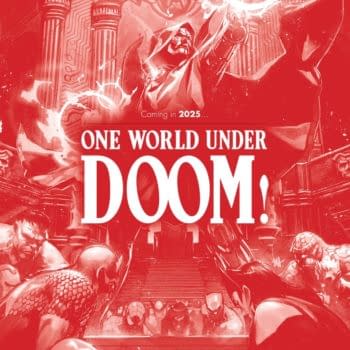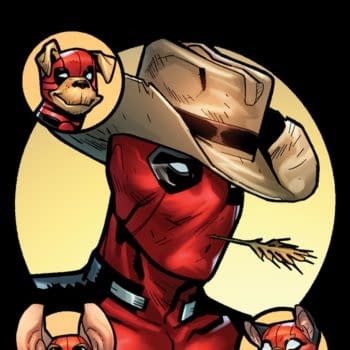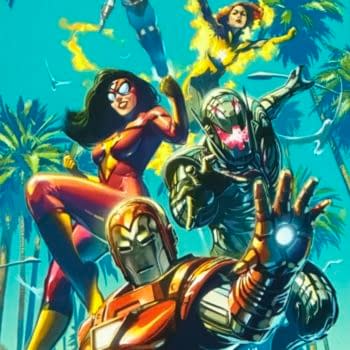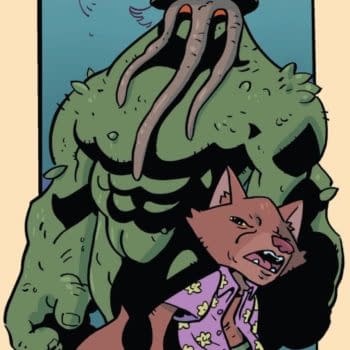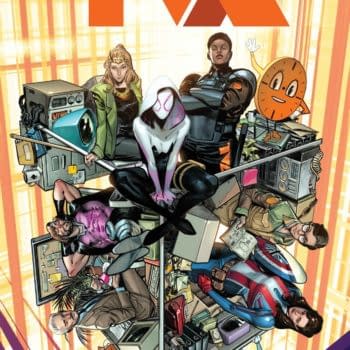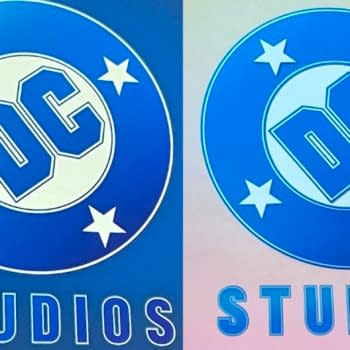Posted in: Comics, Comics Publishers, DC Comics, Image | Tagged: dc comics, diamond, distributor wars, image comics, lunar, ucs
"Hasty, Sociopathic Decisions" – Image Comics' Publisher On DC Comics
Bleeding Cool has confirmed the following was a letter sent by Eric Stephenson, Publisher & Chief Creative Officer at Image Comics, to Image Comics creators and Image Comics staff. It subsequently leaked to Bleeding Cool. We reproduce it, below. We get a history lesson, a look at the current state of events, and a condemnation of the action taken by DC Comics to rapidly drop Diamond Comic Distributors in favour of two new distributors that they created. You can catch up with previous articles on the New Distributor Wars of 2020 right here. And now, Eric Stephenson…
6.11.2020
Dear Creators—
"Those who do not learn from history are doomed to repeat it." It's true: We can either learn from past mistakes, or we can make them again.
In comics, it often seems as though we like to make the same mistakes.
Just ask DC.
Back in 1994, Marvel bought a distributor called Heroes World.
At the time, there were multiple distributors, Diamond Comics Distributors and Capital City Distribution, being the largest among them.
So Marvel bought Heroes World and then announced they would distribute exclusively through that one outfit.
DC's response was to sign an exclusive with Diamond.
That prompted Archie, Dark Horse, and Image to negotiate with both Diamond and Capital for exclusives.
Diamond made the better offer.
Viz and Kitchen Sink signed exclusives with Capital, but by 1996, Capital's business was failing and Diamond bought them out.
A year later, Heroes World went out of business, too, and Marvel returned to Diamond.
Why Diamond?
Well, Diamond was the only distributor left by that point. Sure, there were some small distributors handling indie and alternative titles, but they didn't carry anything from the major publishers. For a publisher of Marvel's size, Diamond was literally the only remaining option when Heroes World went out of business in 1997.
And lest we forget, Marvel was in bankruptcy at the time.
So here we are in 2020, with the world in something approaching the worst shape it's ever been in, and DC has forgotten this bit of comics history and chosen this moment to leave Diamond.
You've no doubt read their statement about how this move was intended to strengthen the marketplace.
Pardon the profanity, but that's bullsh-t.
This is a hasty, sociopathic decision made by people who do not care about the long-term welfare of our marketplace, let alone about comics.
The good news is that just as Marvel wasn't capable of destroying our industry back in 1994, DC – still a distant second to Marvel after all these years – isn't going to, either.
Some of you are concerned about Diamond's continued stability after losing DC's business, but the truth of the matter is that DC is around 30% of Diamond's comics business, and Diamond doesn't just deal in comics.
In addition to distributing comics, Diamond also distributes toys, games, and other merchandise, with games in particular being an increasingly large part of their business. Diamond owns a games distributor – Alliance Games – which services roughly half the number of accounts that make up the comics market and their business has been fairly robust.
As far as comics are concerned, though, the rest of the marketplace accounts for 70% or so of Diamond's Direct Market business.
That doesn't mean this isn't going to be a challenge for Diamond and for the rest of the marketplace, but it's not quite the deathblow so many seem to fear.
That fear, though – the fear that has prompted emails and texts from so many of you, and which has been coursing through the retail community since the news dropped last Friday – underscores something that should alarm everyone in comics:
DC did this without any consideration for how it would affect the rest of the marketplace.
There's a great Maya Angelou quote that along with the quote I opened with, is one of my all-time favorites:
"When someone shows you who they are, believe them the first time."
Generally speaking, when a publisher leaves one distributor for another, there is a transition period. Inventory and data are transferred, accounts are taken care of – everything is done with careful planning so that all involved parties can move forward with peace of mind.
When Marvel bought Heroes World and pulled their business from their other distributors, they gave notice. Not in terms of days, but months.
That is not what happened here.
With everything going on right now – not just a global pandemic that has left our economy on the brink of depression, but an unprecedented number of nationwide protests against police brutality and institutional racism – DC decided to blindside Diamond and the rest of the industry with their decision to end a decades long business relationship.
They're the second largest publisher of comics and graphic novels in the United States, owned by one of the largest telecommunications companies in the world and financially more secure than almost any other publisher in comics.
They didn't have the resources to give even a few months notice? Not just out of professional courtesy, but out of consideration for the rest of the retail and consumer marketplace they will continue to operate in regardless of who distributes their comics?
Ultimately, what this all boils down to is distributor confusion causing retailer panic and disarray, and at the end of the supply chain, you have BATMAN readers wondering what in hell is going on.
And embarrassingly, it's nothing more contrived than negligent behavior and a deep lack of business acumen and poor internal leadership. This might be forgivable from a smaller company with fewer resources and less history in the market, but not from a publisher of DC's stature.
To put that in perspective: There are Image creators who have requested that we hold off on promoting their work because they think it would be tone deaf against the backdrop of current events—but DC made this move as though they were not only tone deaf, but completely oblivious to anything other than their own ambitions.
Our industry is more than one publisher, though, and we will get through this.
Should something happen to Diamond, we aren't without our options, both within the Direct Market and the book trade, but as of now, the hope is that exploring those options won't be necessary. Should that change at any point, we will let everyone know.
I have spoken with Steve Geppi and members of the Diamond team about what's happening, as has Image's President, Todd McFarlane. Our takeaway is that while there will definitely be some challenges ahead for the marketplace, Diamond is not on the verge of collapse.
Someone asked me if Image is still being paid by Diamond, and we are.
Back when Diamond stopped shipping due to COVID-19 and the various statewide stay at home orders, that action – frustrating though it was – prompted Diamond to set up reduced payments to publishers.
The way those payments were structured meant that for eight weeks, we received 25% of what we were owed for sales made from late January to mid-March, with the remaining 75% to be paid out over the following eight weeks.
While that wasn't ideal at the time, the payments we are now receiving are making up for the period when stores were not receiving new product, and we are well on our way back to something approaching "normal."
We're almost a month into shipping comics again and, while not all stores have reopened yet, the drops in our books' orders have been relatively minor. Some titles' orders have actually increased from what they were at pre-COVID.
In other words, there are reasons to be hopeful.
That's not easy for everyone, and that's understandable.
Image isn't owned by AT&T or Disney.
Image doesn't have an overall first look deal with Paramount or Netflix or Amazon Studios or Legendary or HiveMind or any of the other IP farms with little actual interest in selling comic books.
We're not like everybody else.
When Image first started, there were many who accused the Image Founders of leaving Marvel and setting up their own company out of self-interest, and given how incredibly successful Image was in the beginning, they could have easily just produced their own comics and left it at that.
What they did instead, though, was invite their fellow creators to join in building the company they'd started, or as Image's former Executive Director Larry Marder once put it, "to cast off their work-for-hire shackles and join the revolution."
As a result, Image doesn't operate like other publishers—least of all, Marvel and DC.
That makes publishing with Image a little daunting at times, because "not like Marvel and DC" can sometimes be construed as "I have to do everything myself and I don't get a page rate and what if nobody buys my book and I never make any money doing this and will I ever be able to get a job anywhere else again if this doesn't work out?"
But Image has been the company it is for going on 30 years now, because it offers creators the same independence Rob, Todd, Jim, Marc, Erik, Whilce, and Valentino craved for themselves back in 1992.
It isn't always easy, and that independence is at times fraught with hardship and uncertainty, but that independence is what makes it possible for everyone – from a relative unknown at the beginning of their career to a bonafide superstar – to work with Image, instead of for Image, and share the same opportunities.
Or at least the opportunities they want to share.
There is no one way to do things at Image – no masterplan. What looks like an opportunity to one creator may seem like trouble to another, and vice versa.
When the company first started, the founders themselves had a single rule, which was that no partner could tell another how to run their business.
To a large degree, that extends to the company's philosophy toward the creators we work for and with. For some, that's liberating, but for others it's frustrating.
The bottom line, though, is that the idealism that launched the company with such fanfare all those years ago is the same fuel that propels Image along now.
We use the word "creator" a lot – we publish creator-owned comics, so it's hard to avoid – but something that isn't said often enough about Image and its founders is that they love comics. They didn't become the biggest names at Marvel by accident or spend years at their drawing boards prior to that because they had a passing interest in drawing.
Without exception, they loved comics, and it was through their mutual affection for this medium and their shared frustration with the business that had developed around it that they came together to start a company that, frustrating though it may be in its own way, was better than the rest.
Not a company that exists as a line item on a spreadsheet amidst some larger corporate entity's other investments, not as part of a plan to harvest ideas for other media as an end to itself, but as a fully realized vision of what can happen when people who genuinely love what they do come together as a group.
So getting back to DC, and where the comics industry has suddenly wound up as a result of their decision to dissolve their distribution agreement with Diamond, this isn't the first time one of our industry's "Big Two" has shown us who they are, and as history has proven repeatedly, it's probably not the last.
That's scary and it's stressful for all of us, but at the same time, moments like these are why Image exists.
We believe in comics, we believe in this industry, and we believe in you.
And despite how bleak things may look now as we shelter in place and worry what surprises tomorrow might bring, we believe there are better days ahead.
Sincerely,
-e.s.
Eric Stephenson
Publisher
Image Comics, Inc.
I don't how whether I want "hasty, sociopathic decisions" or "completely oblivious to anything other than their own ambitions" as new mission statements for DC Comics, but someone should totally put "I have to do everything myself and I don't get a page rate and what if nobody buys my book and I never make any money doing this and will I ever be able to get a job anywhere else again if this doesn't work out?" on an official Image Comics T-shirt.







